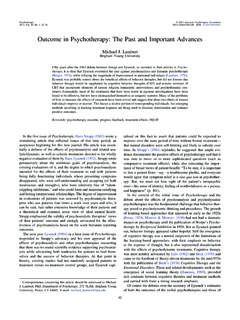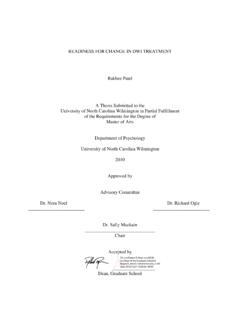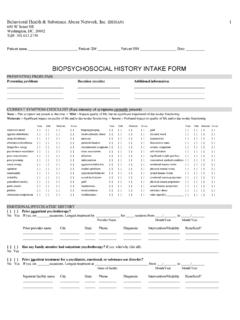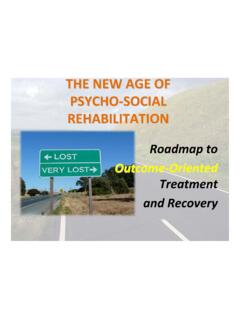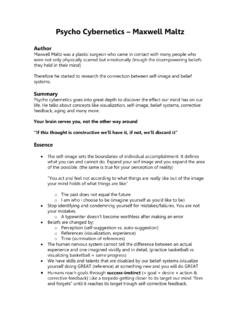Transcription of Inside the Mind of a Psychopath - Vanderbilt University
1 22 Scientific AmericAn mind September/October 2010 AArOn GOOdmAnThe word Psychopath con-jures up movie images of bru-tal, inexplicable violence: Jack Nicholson chasing his family with an ax in The Shining or Anthony Hopkins as Hannibal Lecter, his face locked into an armored mask to keep him from biting people to death. But real life offers another set of images, that of killers making nice: Ted Bundy as law student and aide to the governor of Washington State, and John Wayne Gacy as the Junior Chamber of Com-merce s Man of the Year. Psychopaths are likable guys when they want to the two of us, we have in-terviewed hundreds of prison inmates to assess their mental health. We are trained in spotting psychopaths, but even so, coming face to face with the real article can be electrifying, if also unset-t l i n g . O n e of t h e m o s t s t r i k i n g p e c u l i a r i-ties of psychopaths is that they lack em-pathy; they are able to shake off as mere tinsel the most universal social obliga-tions.
2 They lie and manipulate yet feel no c o mpu n c t io n o r r e g r e t s in fact, they don t feel particularly deeply about any-thing at much of the way regular people m a ke s e n s e of t h e wo rld i s t h rou g h e m o-tion. It informs our gut decisions, our connections to people and places, our sense of belonging and purpose. It is al-most impossible to imagine life without feelings until you meet a Psychopath . But psychopaths often cover up their deficiencies with a ready and engaging charm, so it can take time to realize what you are dealing n e of u s ( K i e h l) u s e d to a s k i n e x p e-rienced graduate students to interview a particularly appealing inmate before ac-quainting themselves with his criminal history. These budding psychologists would emerge quite certain that such a well-spoken, trustworthy person must have been wrongly imprisoned. Until, t h at i s , t h e y r e ad h i s fi l e pimping, drug dealing, fraud, robbery, and on and on and went back to reinterview him, at which point he would say offhandedly, Oh, yeah, I didn t want to tell you about all that stuff.
3 That s the old me. COVER STORYBy Kent A. Kiehl and Joshua W. BuckholtzInside theMindPsychopathof aNeuroscientists are discovering that some of the most cold-blooded killers aren t bad. They suffer from a brain abnormality that sets them adrift in an emotionless world 2010 Scientific Scientific AmericAn mind 23 2010 Scientific American 2010 Scientific American24 Scientific AmericAn mind September/October 2010peter SherrArd Getty ImagesThis appearance of normalcy the so-called mask of sanity has bedeviled the study of psychopaths. Though guilty of the most erratic and irresponsible, sometimes destructive and violent be-havior, they show none of the classic signs of mental illness. They don t have hallucinations or hear voices. They aren t confused, or anxious, or driven by over-whelming compulsions. Nor do they tend to be socially awkward. They are often of better-than-average intelligence. Add that they do not express true re-morse or a desire to change, and it has b e e n e a s y to v i e w p s yc hop at h s no t a s v i c-tims of a dire mental instability but sim-ply as opportunists.
4 To paraphrase the dilemma: Are they mad or simply bad?From the biblical Cain to the kun-langeta of the Yupi Eskimos and the arankan of Nigeria, nearly every culture on earth has recorded the existence of individuals whose antisocial behavior threatens community peace. But thanks to technology that captures brain activ-ity in real time, experts are no longer l i m it e d to e x a m i n i n g p s yc hop at h s ab e r-rant behavior. We can investigate what is happening Inside them as they think, make decisions and react to the world around them. And what we find is that far from being merely selfish, psycho -paths suffer from a serious biological de-fect. Their brains process information differently from those of other people. It s as if they have a learning disability that impairs emotional a collective throwing up of hands, psychiatrists have long written psycho -paths off as beyond help. But now that s c i e n c e i s u n r ave l i n g t h e m e c h a n i s m s b e-hind the disorder, it s time for that atti-tude to change.
5 If specific physiological d e fi c it s p r e ve nt p s yc hop at h s f ro m e mp a-thizing with others, forming stable rela-tionships and learning from their mis-takes, then elucidating them could lead to new treatments: medications, per-haps, or targeted behavioral has launched an ambitious multimillion-dollar project funded by the National Institutes of Mental Health (NIMH) and Drug Abuse (NIDA) and the John D. and Catherine T. Mac-Arthur Foundation to gather genetic information, brain images and case his-tories from 1,000 psychopaths and com-pile it all into a searchable database. To speed the work, Kiehl helped to design a portable scanner a functional MRI machine housed in a trailer that can be brought Inside prison walls, obviating the need for high-level clearances to bring dangerous prisoners believe psychopaths are as de-serving of treatment as anyone with a mental illness, but you don t have to feel s y mp at hy to wa nt to h e lp t h e m.
6 B e t we e n 15 and 35 percent of prisoners are psychopaths. Psychopaths offend earli-FAST FACTSOut of tune with Life1>>Aided by ee Gs and brain scans, scientists have discovered that psy-chopaths possess significant impairments that affect their ability to feel emotions, read other people s cues and learn from their mistakes. 2>>these deficiencies may be apparent in children who are as young as five years old. 3>> When you tally trials, prison stays and inflicted damage, psycho -paths cost us $250 billion to $400 billion a >>psychopaths have traditionally been considered untreatable, but novel forms of therapy show are not merely selfish. Their brains process information differently from those of other people. It s as if they have a learning disability that impairs emotional they lack empathy, psychopaths fake normal emotions so convincingly that they often come across as personable, even charming. they learn to compensate for their emotional deficiencies, much the way an amputee manages without the use of a limb.
7 2010 Scientific American 2010 Scientific Scientific AmericAn mind 25rOBert dALY age Fotostocker, more frequently and more violently than others, and they are four to eight ti mes more li kely to com m it new cri mes on release. In fact, there is a direct cor-relation between how high people score on the 40-point screening test for psy-chopathy [see box on page 28] and how l i ke ly t h e y a r e to v iol at e p a rol e . K i e h l r e-cently estimated that the expense of prosecuting and incarcerating psycho -paths, combined with the costs of the havoc they wreak in others lives, totals $250 billion to $400 billion a year. No other mental health problem of this size is being so willfully heads, empty heartsA man we will call Brad was in prison fo r a p a r t i c u l a rly h e i nou s c r i m e . I n a n i n-terview he described how he had kid-napped a young woman, tied her to a tree, raped her for two days, then slit her throat and left her for dead.
8 He told the story, then concluded with an unforget-t able non s e qu it u r. D o you h ave a g i rl? he asked. Because I think it s really im-p o r t a nt to p r a c t i c e t h e t h r e e C s caring, communication and compassion. That s the secret to a good relationship. I try to practice the three C s in all my relation-ships. He spoke without hesitation, clearly unaware how bizarre this self-help platitude sounded after his awful h a r m i n g a s t h e y m ay s e e m , p s yc ho-pat h s c a n a l s o b e tone - d e a f b e c au s e t he y lack access to their own feelings and those of others. Imagine what it would be like never to be depressed or anxious, never to have regrets or low self-esteem but also never to care deeply for anyone or anything. Psychopaths emotions are shallow: they feel irritated when they don t get their way and turn to risky be-haviors for the flimsiest of reasons.
9 Be-reft of loyalties and passions, they wan-d e r t h rou g h l i f e , of t e n s t r ay i n g i nto c r i m-inality on a whim forgeries, thefts, assaults, even murders may be commit-ted out of some trivial impulse. As for c o mpl e x e m o t io n s s u c h a s d e vo t io n , g u i lt or joy, theirs remains a textbook under-standing it has been said that they know the words but not the music. Dozens of studies reveal that psycho -paths experience the world differently from other people. They have trouble making appropriate moral value judg-ments and putting the brakes on their impulses. They are also hampered in how they respond to emotions, language and distractions a disconnect that is sometimes seen as early as age are curiously oblivious to e m o t io n a l c u e s . I n 2 0 0 2 J a m e s B l a i r of the NIMH showed that they are not good at detecting emotions, especially fear, in another person s voice.
10 They also have trouble identifying fearful facial expres-sions. And a classic experiment in 1991 co-authored by psychologist Robert D. Hare of the University of British Colum-bia, a pioneer in the field (and a mentor to Kiehl during graduate school), found that psychopaths miss the emotional nuances of language. The investigators flashed real and nonsense words in front of pris-oners, some of whom were psychopaths, and asked them to press a button when they saw a dictionary word. Psychopaths were as quick as nonpsychopaths to dif-ferentiate between real and fabricated words. But the experiment went a level deeper, because among the real words some had positive or negative connota-tions ( milk, scar ) whereas others we r e n e ut r a l ( g at e ). F o r t h e n o np s yc h o-paths, emotionally charged words leaped off the screen; their automatic brain re-sponses, measured by electroencephalo-grams, showed a distinctive electrical surge, and they pushed the button faster.

